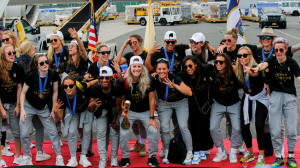|
For official competitions, including the World Cup, the women's
(USWNT) and men's (USMNT) national team players will earn
identical game appearance fees.
For official competitions other than the World Cup, players of
both genders will earn identical game bonuses.
U.S. Soccer becomes the first federation in the world to
equalize FIFA World Cup prize money awarded to both women's and
men's teams for participation in their respective World Cups.
"This is a truly historic moment. These agreements have changed
the game forever here in the United States and have the
potential to change the game around the world," said U.S. Soccer
President Cindy Parlow Cone.
The CBAs, the first of their kind, will run through 2028,
covering the next two World Cups and Olympic cycles. They will
also keep the players among the highest-paid national team
players in the world, U.S. Soccer said.
Under the new agreement, the USMNT and USWNT will have identical
performance-based bonuses for all games and competitions.
The women's team will no longer receive guaranteed salaries and
have the same pay-to-play payments as their male counterparts.
"(The) next step is for other federations around the world to
look to see what we have done and start doing it themselves,"
Parlow Cone told reporters. "And then also encouraging the
confederations and then as well as FIFA to equalize all prize
money."
SPONSORSHIP REVENUES
In another first for U.S. Soccer and the players' unions, U.S.
Soccer will share a portion of its broadcast, partner and
sponsorship revenue with a 50-50 split of that share divided
equally between USWNT and USMNT.
U.S. Soccer said the new revenue-sharing framework will "provide
additional encouragement for all parties to work together to
grow the game".
The agreements also improve player health and safety, data
privacy and the need to balance responsibilities to both club
and country, the federation said.
"The accomplishments in this CBA are a testament to the
incredible efforts of WNT (women's national team) players on and
off the field," said USWNT player and USWNT's player association
President Becky Sauerbrunn.
The agreement came three months after the USWNT and U.S. Soccer
agreed to resolve a dispute over equal pay dating back to 2016
when some players filed a federal wage discrimination complaint,
claiming they were paid less than male players even though they
generate more income for the United States Soccer Federation.
"The gains we have been able to achieve are both because of the
strong foundation laid by the generations of WNT players that
came before the current team and through our unionís recent
collaboration with our counterparts at the USNSTPA and
leadership at U.S. Soccer," Sauerbrunn added.
The deal also covers other areas such child care, retirement,
insurance, parental leave, short-term disability, mental health
impairment, travel, accommodation, equal quality of venues and
field playing surfaces.
The men's World Cup is set to be played in November-December
this year in Qatar, while the women's edition will be held next
year in Australia and New Zealand.
The USWNT are the most successful team in international women's
soccer, having won four World Cups, including the last one in
2019. U.S. men have never won the World Cup.
(Reporting by Manasi Pathak, Rami Ayyub and Brendan O'Brien,
additional reporting by Amy Tennery; editing by Martyn Herman
and Ed Osmond)
[© 2022 Thomson Reuters. All rights
reserved.]
This material may not be published,
broadcast, rewritten or redistributed.
Thompson Reuters is solely responsible for this content. |
|






